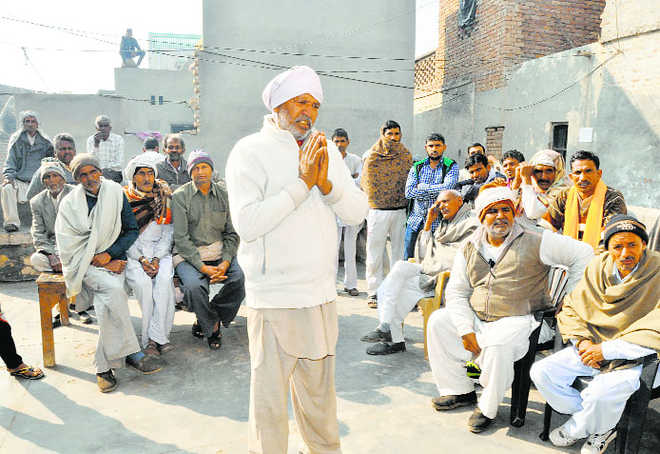Hurdle that still castes a shadow on progress
The year 2016 will see more focus on Digital India and Smart Cities, introduced by the Government last year. These initiatives involve the public at large. People in India are divided on the basis of caste, religion and ethnicity. It is important to have a vision of holistic development, where the Government simultaneously focuses on removing inequalities.
Violence against Dalits continues unabated. On December 4, in Rajasthan a Valmiki was mutilated for allegedly falling in love with a caste Hindu woman. Recently, in Punjab, the limbs of two Dalits were chopped off. Most importantly, violence against Dalit women is on the rise. Though the Constitution enshrined equality of all and abolished untouchability, in reality inequality continues unhindered.With the rising number of atrocities, the voices of the Dalits against such violence have also become louder.
As a response, the Government has been bringing out amendments, allegedly to strengthen the legal provisions in acts such as the Scheduled Caste and Scheduled Tribe (Amendment) Bill 2014, and the Prohibition of Employment of Manual Scavengers and their Rehabilitation Act 2013. But the convictions under these acts are very minimal. If the Parliament enacts a law, it is the executive’s responsibility to implement it and the judiciary’s duty to interpret the law and for the media to monitor it.
Instead of erasing inequality within society, the NDA government, in order to make inroads into the Dalit constituency, chose Dr Ambedkar and his image, rather than his ideology, as a tool. Professor Gopal Guru, in a lecture delivered in Columbia University, asks, “Was he (Ambedkar) simply a constitution maker? Was he the leader of Dalits? What was he?..A tragic question associated with Ambedkar, the problem lies as Nicolas Dirk rightly points out in Caste of Mind”. Further, he says, “As Toni Morrison says, Blacks in United States do not grow in the eyes of whites…similarly, Ambedkar doesn’t grow in the eyes of Brahmins and caste Hindus, it is a rhetorical statement I make but you always read that Ambedkar is leader of Dalits, a constitution maker which is a little unfair…”
The NDA did not stop with inaugurating Ambedkar’s memorials or with recognising him as constitution maker but also published a book, Revisiting Ambedkar, distorting facts about Ambedkar to fit into their narrative. It might be a coincidence, but while the Central Government and the Maharastra government commemorate Ambedkar, the volumes of Dr Babsaheb Ambedkar Writings and Speeches, published by the Maharashtra Education Department and sold by the Government Press Book Depot at Mumbai, have been out of stock for the last two years.
The NDA also went ahead with a two-day special session in Parliament to discuss the “Commitment to the Constitution as part of the 125th Birth Anniversary Celebrations of Dr BR Ambedkar”.
The Opposition parties in Parliament echoed what shocked many outside the Parliament: The rising “intolerance” in India. It is important to note that in 2002, when the Indian National Congress was in power in Haryana, a few Dalits were arrested by the police alleging that they had killed a cow. A mob gathered and dragged out the Dalits, killed them on the main road, while men in uniform watched. Such references are not mentioned even by the BJP. It was quite shocking that none of the discussions, neither inside nor outside the Parliament, referred to Ambedkar’s discomfort towards the Constitution being not followed in the spirit it was meant to be. I quote from the Rajya Sabha Official debates online for September 14, 1953, “Friends will forgive me if I say that .. are instances of the most violent kind of rape on the constitution. It was never intended that a nominated member of a legislature should become the Prime Minister. Never. …Here we have, immediately after the election, a man who never stood and faced the electorate, but went and got himself nominated and subsequently maneuvered to be the Prime Minister….Sir I am considerably shocked at the levity with which the Government is handling this Constitution—the utter levity.”
The Swachh Bharat Abhiyan, introduced in 2014, was a voluntary initiative to change the citizens’ mindset. In 2015, the Government levied a tax on this initiative. The World Bank in a report reminded us with data that 2.4 billion people worldwide lack proper sanitation, and 750 million of these live in India. Out of those, 80 per cent live in rural India. The Bank has approved a loan of $1.5 billion to support the Swachh Bharat Abhiyan. The Haryana government made a law that only those having toilets can contest the election. As many critics opined, the projects introduced by the Centre should not become merely photo-ops to grab eyeballs. While taking interest in Digital India and Smart Cities, the Government must also engage in removing inequality rampant in India.
The caste question in India becomes so crucial even when we study the disaster that affected Chennai. In the aftermath of the Chennai flood, relief operations have once again reasserted that India is still a society divided by caste, where certain occupations are “reserved” for certain castes. During and after the flood, there were reports that Dalits were not given the relief items.
Many across different states came forward to help in “relief” work, but very few came forward for sanitation work. Otherwise, around 25,000 municipal workers would not have been brought in from other panchayats or municipalities, even from distant Odisha and Maharastra. Swachh Bharat is yet to have the slightest impact on the ground even one year later. If the government doesn’t pay attention to the reality of inequality on the ground, then its programmes involving large-scale public funds will only be squandered and that would definitely not be achhe din for the common man.
The writer is a Fellow at the Indian Institute of Advanced Study, Shimla










